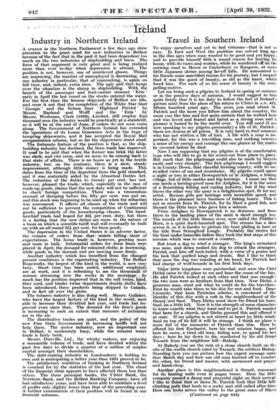Industry in .Northern Ireland •
A SPEACH in the-Northern l'arliamentn few days ago drew attention to the great need for new indintries in Belfast because of the fact that in the past it had been dependent too much on the two industries of shipbuilding and linen. The force of that argument is. vefy great and is being realized more than ever to-day . when depression is abroad., The position is not, however, one of unrelieved gloom. Things are improving, the number of Unemployed is decreasing, and one industry in particular, that of ropemaking, is again on full time, and, indeed, extra time. The ugly pall that hangs over the situation is the slump in shipbuilding. With the launch of the passenger and fruit-carrier steamer ' Erin ' early in April the last vessel on the stocks entered the water. For the first time the famous shipyards of Belfast are idle, and were it not that the completion of the White Star liner ` Georgic ' and the Nelson liner ' Highland Patriot ' by Messrs. Harland and Wolff and the ` Erin ' by Messrs. Workman, Clark (1928), Limited, still employ four thousand men the industry would be practically at a standstill, as it will be at the end of June, if orders do not soon come along. The Government of Northern Ireland has extended the operations of its Loans Guarantee Acts in the hope: of tempting shipowners, and it has accepted the Royal Mail reorganization scheme, but so far the shipowners stand aloof. The fortunate feature of the position is that, as the ship- building industry has declined, the linen trade has improved. It used to be said that when The former was brisk the latter was slack, and vice versa, and we seem to be coming back to that state of affairs. There is no boom as yet in the textile industry, but, on the contrary, there is a slow, steady improvement, although little money is being made. This dates from the time of the departure from the gold standard, and it was -materially aided by the Abnormal Duties Act. The reduction of the duties to twenty per cent. has not, however, pleased the trade,,' which, especially in the ease of Made-up goods, claims that:the new duty will not be sufficient to check foreign competition. There was a tremendous amount of dumping before the fifty per cent. was put on, and- this :stock -was beginning. to. be. used -up when the reduction was announced. It affects all classes of the trade and will not be sufficient to prevent the competition of Continental goods, particularly of the housekeeping classes. The hand- kerchief trade had hoped for 334 per cent. duty, but there is a feeling that the new duties are more in the nature of a basis on which-a scientific tariff wall will eventually be built . up with an all-round 881 per cent. for linen goods.
The depression in. the United States is an adverse factor, the -volume of orders from that:- some • falling ' short of expectations. The home trade is, however, growing more and more in bulk. Substantial orders for dress linen were -placed in April, the demand for coloured cloths is increasing, while goods in the damask end are moving more freely. • Another industry which has benefited from the changed present conditions is the ropemaking industry. The Belfast Ropeworks, the largest of the kind in the world, is now very busy. Short time has been ended, additional employee.s are at work, and it is refreshing to see the thousands Of women streaming into the works in the mornings. _ So much has the ,position improved that in the soft twine, hard, fibre cord, and binder twine departments double. Shifts-
lisve
been introduced, these products being shipped to Canida, and in fact all over the globe.
The tobacco industry is also. doing well. „Messrs. Gallaher, who have the laigcst factory, of the kind in the world, were able to increase their dividend last year, and trade hal' fin- proved even since that. The demand for the firm's goods is increasing to such an extent that rumours of extension are in the air.
The distributive trades are quiet, and the policy of the -new Free State Government in increasing tariffs will not help them. The motor industry, now an important one in Belfast, is moderately busy, while the mineral water trade is fairly brisk.
. Messrs. Dunville, Ltd., the whisky makers, arc enioying a reasonable volume of trade, and have decided within the past few days to .divide a quarter of a- million of surplus capital amongst their shareholders.
The shirt-making industry in Londonderry is holding its awn and is anticipating a better year than 1981 proved to be. The satisfactory condition of banking in Northern Ireland is vouched for by the statistics of the last year. The cloud of the financial crisis appears to have affected them less than others. The three principal banks, the Ulster Bank, the Northern Bank, and the Belfast Banking Company, have all had satisfactory years, and have been able to maintain a level of profits only slightly lower than that of the preceding year. A further examination of their position will be found in our financial columns,






































 Previous page
Previous page